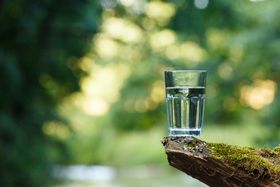Pick the Right Water Filter to Improve Your Home Water Quality
Updated January 31, 2024.

Water filters remove potentially harmful compounds and elements that cause drinking water to have an unpleasant taste and smell like bacteria, chlorine, and even metal. Home filtration systems can improve water quality and purity, but how do you pick the right one for you? Read on to find out.
How Do Home Water Filters Work?
There are many home filters, and each one works differently based on the kind of water it is designed to treat. Here is a look at the top five types of home water filters.
- Carbon filtration Carbon filters trap and absorb contaminants in the water, including sediment and harsh chemicals like chlorine. The contaminants are drawn to the surface of the activated carbon and bond to it, the same way a magnet attracts and holds iron filings.
- Ultraviolet filtration A UV filtration system uses UV light to disinfect water by removing harmful bacteria and pathogens.
- Distillation This filtration method is also called steam filtration and works by heating water until it reaches boiling point. The water vapor is then collected as it condenses. Distillation removes many of the contaminants, including trihalomethanes, in drinking water.
- Reverse osmosis A reverse osmosis system reverses the natural flow of water so that it passes through a semi-permeable membrane that removes contaminants. However, the reverse osmosis system is part of a comprehensive filter system.
- Ceramic filtration Ceramic filters stop contaminants larger than pore size, making them good for microbes and bacteria.
Home water filters work to change the taste and remove unwanted impurities from the water out the tap like sediment, dirt, organic compounds, odor, and bacteria to create better quality water, generally with mineral content.
10 Different Types of Home Water Filters
There are many different home water filter systems available, so we have outlined the top ten:
1. Water Pitcher Filters
A water pitcher filter is a large pitcher with a built-in water filter. These are easy and affordable ways to get clean drinking water in your home.
2. Faucet Filters
A faucet filter attaches directly to your sink faucet. They have a pass-through that allows the sink to flow freely when the filter is not in use. To get filtered water, you simply flip the switch on the filter to activate it.
3. Countertop Filters
There are two types of countertop filters:
- The first type has a large reservoir on the bottom with a filter on the top. This filter holds much more water than a pitcher but doesn’t fit into the refrigerator.
- The second type hooks onto your house’s main water at the kitchen sink. It has its own faucet that dispenses filtered water when turned on. These are smaller and take up less counter space.
4. Under-Sink Filters
This filter fits underneath the sink and hooks directly onto the main water line, so you get an unlimited capacity of filtered water. They include their own small faucet mounted by the main faucet on the countertop.
5. Whole House Filters
Whole-house filters are the largest type of home water filter and are designed to purify all the water for your entire home. These filters hook into the mainline of your house and typically require professional installation.
6. Water Bottle Filters
These are some of the smallest and least expensive home water filters on the market. They often feature a filter straw that filters the water on its way to your mouth and is convenient for drinking water wherever you go.
7. Ultra-Violet Filters
UV filters work by exposing the water to UV light that kills bacteria, viruses, and protozoa. These filters are small and lightweight and run on batteries. However, they do not remove sediment from the water.
8. Reverse Osmosis
As discussed previously, reverse osmosis is a very involved form of filtration that essentially removes everything from the water, including minerals. Reverse osmosis water filters may have to be installed by a professional.
9. Squeeze or Gravity Filter
This filter is small, portable, durable, and reliable and is mainly designed for backcountry or emergency use. The gravity filters have you hang the reservoir and allow gravity to pull the water down through the filter. A squeeze filter enables you to force water through the filter using a water bag reservoir.
10. Portable Pump Filter
These filters are also designed for emergency or backcountry use. This filter involves you putting a hose into the water source and manually pumping a handle that creates suction. The water is pulled through the filter and expelled from the hose on the other side.
Do At-Home Water Filters Remove Bacteria?
In general, water filters do not kill bacteria; rather, they may remove some bacteria from the drinking water. Some filters are better at removal than others, which is why it is important to understand the different filters and which are more effective for what you’re looking for when it comes to drinking filtered water.
UV filtration, reverse osmosis, and ceramic filters effectively remove harmful bacteria and viruses. It is important to always keep your home water filter clean as some water filters remove biocides, which are substances that control the growth of harmful bacteria like chlorine. Without biocides, the bacteria could regrow, unless the water filter is cleaned and the water is stored in a sterile, cool, and dark place.







![3 Best Water for Athletes: Fuel Your Performance [{year}]](https://entail.mayuwater.com/en-assets/mayuwater/fit-in/280x280/shutterstock_2364200823-1695372721925.jpg)
